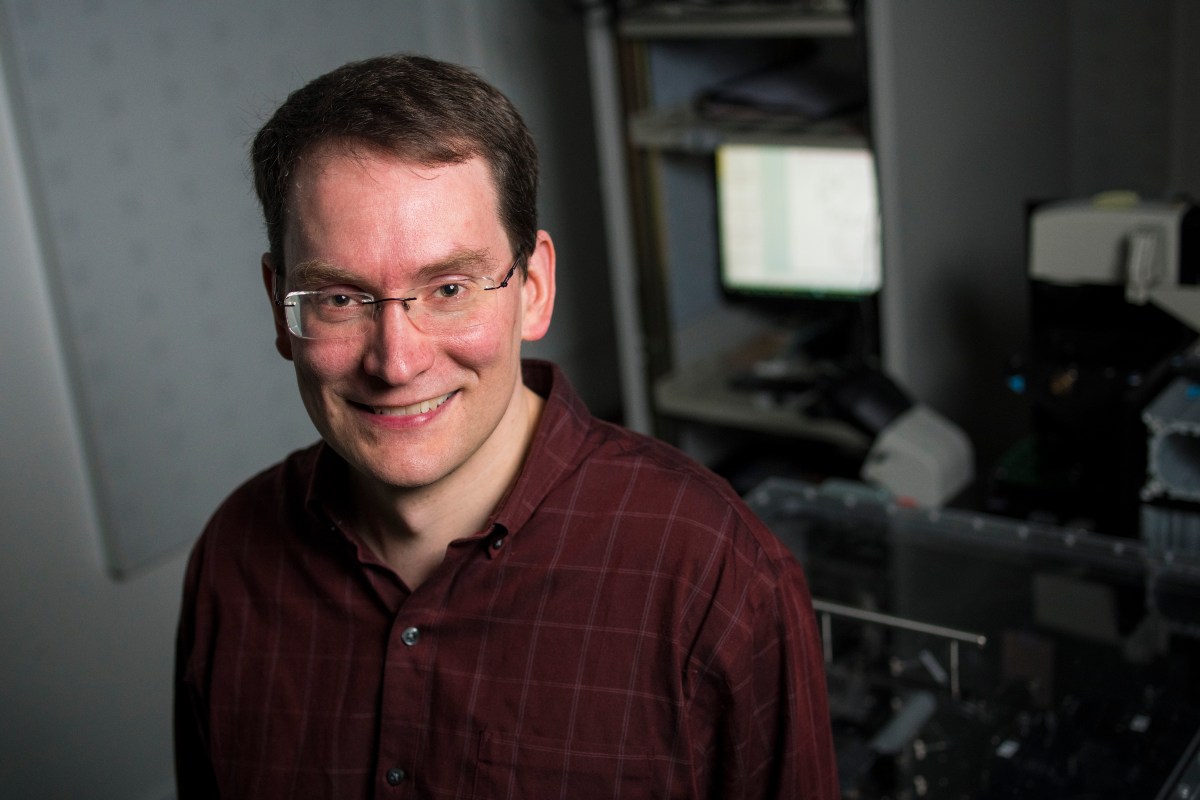
Michael Woodside, professor in the Department of Physics, is searching for a drug that inhibits the replication of the novel coronavirus. Photo credit: John Ulan
The search for a drug that inhibits the replication of the novel coronavirus is underway in the University of Alberta’s Faculty of Science.
Michael Woodside, professor in the Department of Physics, has received $370,700 in emergency funding from the Canadian Institutes of Health Research (CIHR) to support his work identifying a drug that will prevent the virus responsible for the COVID-19 pandemic from replicating once inside an infected host. This research is also supported by Alberta Innovates.
“We aim to identify drugs that can be tested for effectiveness and safety in future trials,” said Woodside. “The plan is to screen first for drugs that are already approved for human use that could be repurposed to treat COVID-19 more quickly before broadening the search to potential drugs that are not currently approved.”
The genome of the novel coronavirus is made up of ribonucleic acid (RNA), rather than DNA. Once inside an infected host, the virus inserts its RNA genome into the cell causing it to produce the proteins that the virus needs in order to replicate. To do this, the novel coronavirus uses a process called programmed ribosomal frameshifting (PRF)—a topic that biophysicist Woodside and his lab have been studying for many years.
Using laser tweezers to mimic what happens inside an infected cell, the researchers have identified the mechanism through which PRF is triggered and are now searching for molecular compounds to prevent this process from happening in the first place.
“Most efforts to find drugs look for compounds that target the viral proteins directly,” explained Woodside. “What's different about our approach is that we are targeting the virus through its RNA, rather than the proteins.”
Using the state-of-the-art microscopy quiet space and optical tweezers at the National Research Council of Canada’s Nanotechnology Research Centre, Woodside is working closely with Jack Tuszynski, a biophysics professor in the Department of Physics, currently on secondment to the Department of Oncology in the Faculty of Medicine & Dentistry. A growing list of graduate students as well as collaborators in the US, to solve the many problems involved in identifying and testing potential drugs. Working together is more important now than ever, Woodside explained.
“Interdisciplinary research and scientific collaborations are essential to stopping the COVID-19 pandemic,” said Woodside.
“Solutions have to engage expertise and approaches across a wide range of areas to understand the biophysics of the viral molecules, the biology of virus replication, the chemistry of drugs and their interactions with targets, the response of the immune system, the symptoms and epidemiology of the disease, and the response of patients to treatments.”
In the coming months the research team is focused on building and validating a model of the viral RNA for drug screening. Following that, the screening will take place to identify approved drugs before any potential candidates move toward preclinical tests.
Learn how University of Alberta-led research is supporting global efforts against the COVID-19 pandemic on the University of Alberta COVID-19 research hub. Students, faculty, and staff can stay up-to-date with the latest information on COVID-19 for the campus community online.